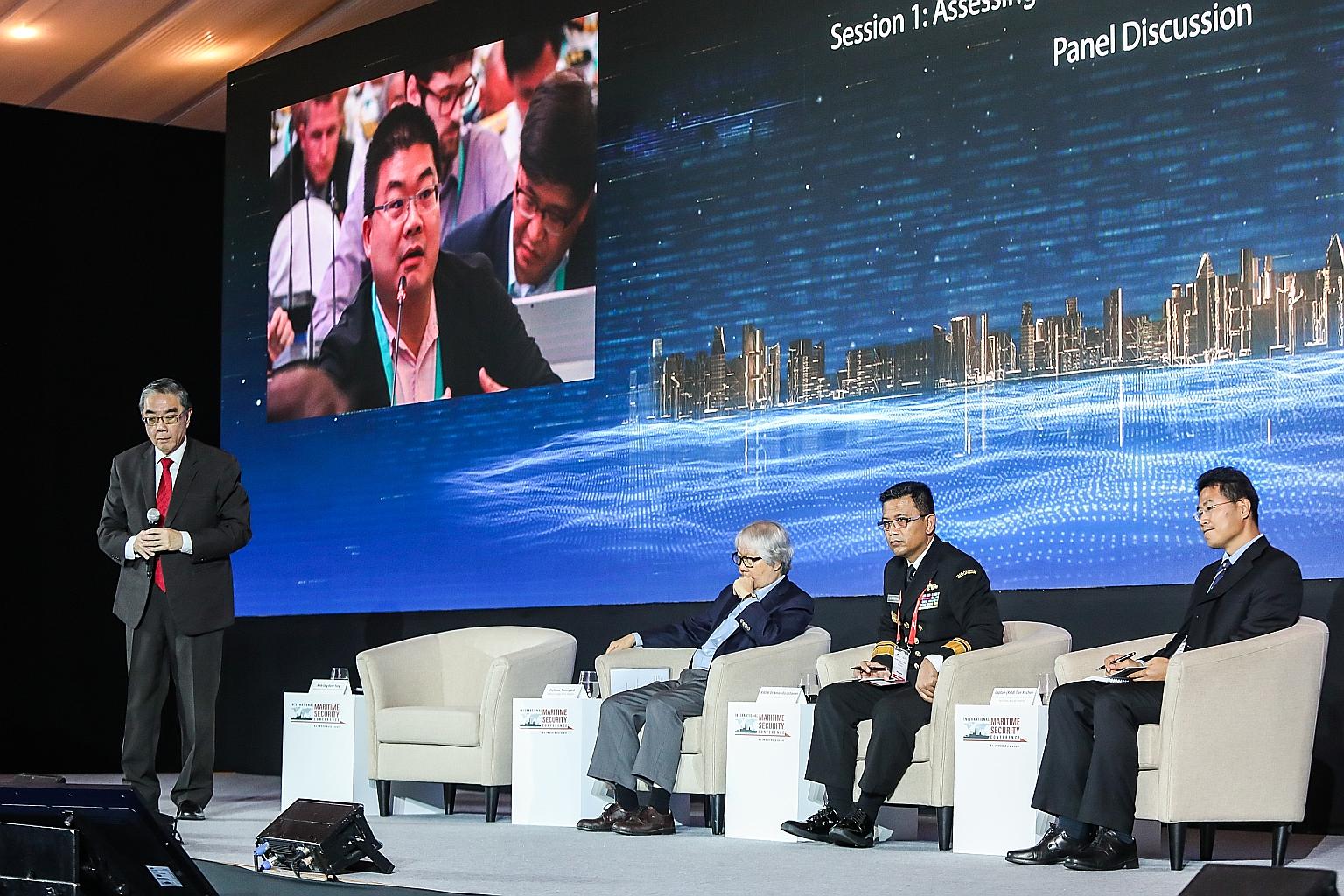Lively debate on interpreting laws at maritime conference
UN Convention on the Law of the Sea not product of the West or ambiguous, says Tommy Koh
Sign up now: Get ST's newsletters delivered to your inbox

From left: Ambassador Ong Keng Yong, the moderator, and panellists - Ambassador-at-Large Tommy Koh, Rear-Admiral Dr Amarulla Octavian of the Indonesian Navy and Captain (Ret) Tian Shichen, research fellow with the Collaborative Innovation Centre of South China Sea Studies, Nanjing University - during a discussion at the 6th International Maritime Security Conference yesterday.
PHOTO: LIANHE ZAOBAO
Differing interpretations of the international law of the sea took centre stage at a maritime conference yesterday involving academics and navy chiefs from around the world.
Ambassador-at-Large Tommy Koh had a spirited exchange with a Chinese academic over whether the United Nations Convention on the Law of the Sea (Unclos) had involved input from Asian countries, and if it made a distinction between merchant vessels and warships when it came to rights of innocent passage.
During the 6th International Maritime Security Conference, Chinese researcher, Captain (Retired) Tian Shichen, had suggested that there was a distinction between warships and merchant ships with regard to the rights of innocent passage in the territorial sea and cited it as one of the most controversial aspects of Unclos.
The research fellow with the Collaborative Innovation Centre of South China Sea Studies at Nanjing University had also questioned whether the existing rules-based order reflects Asian values and said Asian countries were not respected during the time when Unclos was crafted, beginning from the 1950s.
Responding, Professor Koh, a fellow panellist in the session, Assessing The Current Rules-based Maritime Order, disagreed that the convention was ambiguous on the distinction between merchant vessels and warships, adding that those who crafted the convention were conscious of the need to make it work for both the merchant fleet and navies of the world.
The United Nations convened the Third UN Conference on the Law of the Sea in 1973, and after nine years of negotiations, Unclos was adopted in 1982. Prof Koh served as conference president in the final year.
Prof Koh said: "Unclos is not a product of the West. If anything, the principal dynamic in the negotiation were the aspirations of the newly independent countries of the Third World."
Later, replying to a question on a problem of states having different interpretations of Unclos, Prof Koh said: "I'm sorry to say to you that there is very little integrity in the world. As an old man, I feel very sad when I look at how the states, parties to Unclos, have behaved."
Speaking to more than 400 participants from navies and coast guards, maritime industries, academia and think-tanks at the Changi Exhibition Centre, he gave the example of how states would view rocks as islands, and vice versa, depending on their interests.
"If the feature belongs to you, you say it's an island, if it belongs to your neighbour, you say it's only a rock," Prof Koh added.
The five-hour conference was part of the International Maritime Defence Exhibition and Conference Asia, which ends today.
Singapore's Chief of Navy, Rear-Admiral Lew Chuen Hong, who gave the opening remarks at the conference, said states have a responsibility to continue strengthening Unclos-centred frameworks as a contribution to lasting stability.
"Because foundations that are not constantly strengthened or emphasised do have a tendency to slowly erode away," he added.
But RADM Lew said having stability provided by Unclos does not mean that there is a lack of competition. "That would perhaps be somewhat unnatural. Rather, (Unclos creates) norms about competition without leading to conflict."
Admiral John Richardson, Chief of Naval Operations of the United States Navy, made a similar point in replying to a question from a Chinese academic on how he envisaged the relationship between the US and China in the disputed South China Sea where tensions have flared between both over US freedom of navigation operations and Chinese territorial claims.
"Competition is something that we should all be very comfortable with, and expect, actually," said Adm Richardson. "But if that competition is manifested in a way that abides by these rules, then we can compete in ways that don't lead to any kind of kinetic conflict - (that) I think would be a negative, not only for the two nations that are competing but the entire region."


